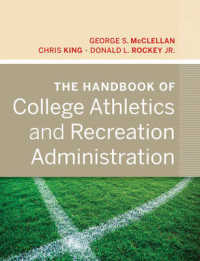- ホーム
- > 洋書
- > 英文書
- > Religion / Ethics
Full Description
Throughout Latin America, observers and activists have found in religion a promise of deep and long-lasting democratization. But for religion to change culture and politics, religion itself must change. Such change is not only a matter of doctrine, ritual, or institutional arrangements but also arises out of the needs, values, and ideas of average believers. Combining rich interviews and community studies in Venezuela and Colombia with analysis of broad ideological and institutional transformations, Daniel Levine examines how religious and cultural change begins and what gives it substance and lasting impact. The author focuses on the creation of self-confident popular groups among hitherto isolated and dispirited individuals. Once silent voices come to light as peasants and urban barrio dwellers reflect on their upbringing and community, on poverty and opportunity, on faith, prayer, and the Bible, and on institutions like state, school, and church. Levine also interviews priests, sisters, and pastoral agents and explains how their efforts shape the links between popular groups and the larger society.
The result is a clear understanding of how relations among social and cultural levels are maintained and transformed, how programs are implemented, why they succeed or fail, and how change appears both to elites and to ordinary people. Originally published in 1992. The Princeton Legacy Library uses the latest print-on-demand technology to again make available previously out-of-print books from the distinguished backlist of Princeton University Press. These editions preserve the original texts of these important books while presenting them in durable paperback and hardcover editions. The goal of the Princeton Legacy Library is to vastly increase access to the rich scholarly heritage found in the thousands of books published by Princeton University Press since its founding in 1905.
Contents
List of FiguresList of TablesForewordPreface and AcknowledgmentsNote on the InterviewsPt. IIssues and Contexts1Popular Voices3Defining and Finding Popular Groups6Initial Perspectives on Theory and Practice13Studies in Latin America20Studying Popular Groups, Hearing Popular Voices23The Structure of This Book292Liberation Theology, Base Communities, and the Pattern of Change in Latin America31Context and Conjuncture: The Pattern of Change in Latin America32Central Ideas in Liberation Theology39Liberation Theology and Base Communities: Ideas and Action44Conclusion513Colombia and Venezuela: Nations, Churches, and Programs54State, Politics, and Associational Life55Socioeconomic and Demographic Contrasts59The Churches: Contrasts in Structure, Ideology, and Organizational Strategy65Popular Work: Alternative Views82Conclusion914Colombia and Venezuela: Dioceses, Villages, and Barrios94Facatativa94Barquisimeto107Cali116Comparative Perspectives124Pt. IIActors and Experiences5Being Religious, Reading the Bible, Becoming Church133Being Religious and Reading the Bible134Biblical Texts and Readings139Becoming Church: Varieties of Popular Experience146Transforming Popular Religion167Conclusion1776Popular Needs and Popular Ideals181Being Poor182Fellowship, Sociability, and Self-Image193Images of Church and Clergy199Empowering the Poor2077Priests, Sisters, and Pastoral Agents213Background and Personal History215Working230Opting for the Poor, Popular Religion, and the Nature of Groups242Two Matched Profiles252Conclusion2708Selected Life Histories272Huberto Vanegas: A Lay Pastoral Agent273Two Colombian Women: Olga Ceballos and Susanna Madrid280Two Peasant Men: Fortunato Duque and Patricio Alvarez294Conclusion310Pt. IIITheoretical and Comparative Reflections9Linking Everyday Life with Big Structures317Consciousness, Ideology, and Culture322Mediators, Mediations, and the Question of Democracy335A Note on Class344Conclusion35010The Future of Popular Voices353Reprise354Explaining Change362Are Popular Voices Unique?365Facing the Future368Knowing about the Future371Envoi374Bibliography375Index397








